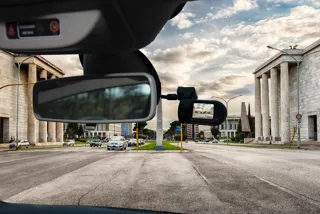Telematics data is “very effective” in encouraging behaviour change among drivers to improve fleet safety, according to Dr Lisa Dorn, associate professor of driver behaviour at Cranfield University.
She told delegates at ACFO’s spring seminar, held at the Vox Conference Centre, Resorts World, Birmingham, that there was “a lot of work to be done” to help drivers overcome lapses that either resulted in crashes or increased the risk of incidents.
She said: “If drivers are not aware of the danger they are in how can they be expected to change behaviour? Telematics data is a good way of fleet managers providing evidence to address the risk.”
Highlighting that there was a range of driver behaviour interventions to manage fleet safety and teach new skills to employees on the road, Dr Dorn suggested that “knowledge and skills-based driver training in the long run will not keep fleets safe”.
She continued: “Fleets need to do something that is more in-depth. When not being observed driver behaviour returns to what it was hence the benefits of telematics because drivers are being continuously monitored.”
Describing telematics and the management information gathered as “nudging technology to coach drivers to understand themselves” and change behaviour, Dr Dorn said: “Fleet managers can use telematics interventions to drive very effective feedback through coaches.
“Having a conversation with drivers once a week is very beneficial. If fleets do not keep messages going and reminding drivers of their responsibilities then very soon behaviour drifts back to before interventions were introduced.”
Dr Dorn concluded that for fleets that wanted to change driver behaviour over the long term telematics’ data and a coach were required “and not just a one-off driver training intervention” and added: “Don’t just leave telematics working in the background because eventually drivers will ignore the technology.”
Fleet managers must stop ‘tinkering’
The seminar also heard from Alison Moriarty, risk and compliance manager at Skanska UK, who called on fleet managers to stop “tinkering” with policies and use technology-based data to rewrite procedures.
She said: “We need to go back to square one with everything that we know and put our policies in place so technology is not chasing us down the road, but we are using technology to transform our fleets.”
Calling on fleet managers to “move forward at the same pace as technology”, Moriarty said she imagined that some fleet decision-makers were still using spreadsheets to manage vehicles.
What’s more, some fleets that had turned to telematics were “doing something” with the resulting vehicle, driver and journey management information, but Moriarty asked: “Is change really being addressed?”
Research suggests that using a hands-free mobile phone while driving is as dangerous as drink-driving, but said Moriarty, few businesses banned usage. Instead they had adjusted fleet policies to advise drivers to perhaps only speak briefly and to return the call when safe to do so.
“If fleet managers had known that drivers using a hands-free mobile phone was that dangerous when they started to be introduced they would have banned them,” she said. “We are not keeping up with technology; we are tinkering.”
She also suggested that while speeding drivers were breaking the law an employee who perhaps stole paper from their employer could be dismissed for theft.
Moriarty, who is a magistrate, said: “With telematics data speeding drivers can be identified. The only difference between an employee stealing from a business and speeding is that they are not going to kill someone by stealing paper. So why is not speeding treated like theft as a dismissal offence?”
She continued: “It is time with all the information that we have to forget the policies we have in place and think about what our future strategy and policy is. Fleet managers then need to write policies and procedures from scratch based on what is known and ensure employees understand why they are being monitored through the use of telematics.
“Fleet managers have data in their arsenal and they need to use it to monitor and evaluate and change the way drivers think.”
For more from ACFO’s spring seminar see the next edition of Fleet News.





















Login to comment
Comments
No comments have been made yet.